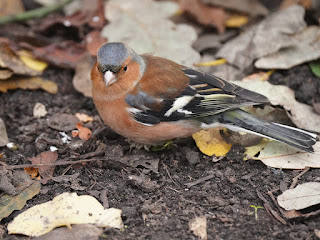A colder day with a rising wind sent the Little Owl back out of sight in her tree. There wasn't much to see of the small birds in the Flower Walk either, just a flock of Long-Tailed Tits going over.
At Mount Gate, one of the Blue Tits came out to be fed.
The Rose Garden was a bit more lively, and there was another Blue Tit in the shrubbery ...
... with the male Chaffinch on the ground below ...
... and a Robin singing in the hedge. The Wasteland is still making a hideous racket that almost drowns its song, but it closes on 6 January. However, there will be heavy lorries trundling down the Serpentine Road for a couple of weeks before some kind of peace is restored.
I was followed around by a Coal Tit. Here it is eating a pine nut in a tree next to the gate I was leaving through.
It's a long time till the mating season, but that doesn't stop Feral Pigeons. They often nest in deserted buildings, getting in through broken windows, where they are shielded from the winter weather.
The Jays in Kensington Gardens were out in force again. This one was by the Serpentine Gallery.
A Carrion Crow had won a bit of cake by the boat house snack bar. Black-Headed Gulls hung around enviously, but the crow kept a firm grip on its prize and flew away to enjoy it in private.
The dominant Black-Headed Gull whose territory is the landing stage at the Diana fountain saw off an intruder and preened himself in a self-satisfied manner.
We've had videos of Herring Gulls doing the worm dance before, but I've never seen one bringing up so many worms in such a short time. It was on the lawn in the Rose Garden.
The nesting Grey Heron at the east end of the island was just visible lying low in the nest. This is the pair in the middle, still together but showing no sign of breeding yet. As we have often seen, they can hang around for months before starting.
The number of Coots in the park has been going up steadily for years, and there must now be more than 300 on the lakes and the Round Pond. A sweep round the Serpentine shows only a few of them.
The Moorhen in the Dell could be seen at the back of the lawn wandering around contentedly with its new young friend.
The gang of six Mute Swan teenagers went under the bridge with the mother of five of them to spread alarm and despondency on the Serpentine.
The Gadwall in the Italian Garden was mooching around alone. It knows perfectly well that if it flies on to the lake it will find others, but for some reason prefers to stay here.
The male Egyptian Goose at the Henry Moore statue was alone too, but probably for another reason: his mate is nesting again in a hollow tree nearby. They've given up the dead tree as a nest site since it's now falling to pieces, and I haven't found where their new nest hole is.
The Royal Parks are closed again tomorrow in yet another panic about the wind, at least till 2 pm when the light will be too bad for proper pictures. I think I'll go to Southwark Park and see what I can find. Best wishes for a very happy New Year to all readers.













Is there a possibility that there is an influx of coots over the winter from other areas of London or are they residents all the year round in the park?
ReplyDeleteMore probably fly in during very cold weather when smaller ponds freeze, but otherwise we have a large permanent resident colony.
DeleteHappy New Year, Ralph! Here's to another year full of birds, charm, good writing and excellent pictures.
ReplyDeleteI wonder if that Herring Gull is exceptionally good at dancing, or the worms in the area are exceptionally foolish.
Tinúviel
And the happiest of New Years to you, and may it see the beginning of a return to sanity in the world, though there is a long and hard way to go.
DeleteHerring Gulls often search for worms on that bit of lawn. It's next to some flower beds that are well fertilised with leafmould, and this may nourish greater activity in the surrounding area. The gulls are very discriminating about good dancing floors. Another is the expensive and carefully maintained turf in the enclosure of the Diana fountain.